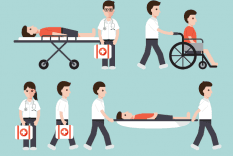Employers and Universities: Work with us?

60 Second Interview: Emergency Medical Technician
Laura is an emergency medical technician, driving ambulances and helping people in serious need. She tells us how she got started in healthcare, and what's the hardest part of her job.
Name: Laura
Company: UK Ambulance Service
Industry: Medicine & Healthcare
What is your job? Emergency Medical Technician
How long have you been doing this job? 3 years – current job role for 6 months
Education
Degree: LLB in Law.
A-levels: Chemistry, biology, English literature
1. What was your very first job?
Hairdresser's assistant.
2. What did you want to do when you were at school?
Actress.
3. What made you want to do your current job?
4. How did you get there?
I’ve had lots of previous jobs, before eventually studying law and practising for 10 years as a lawyer. But I realised I wanted to work to help people, not be tied to a desk all day, and decided to work in medicine.
5. What is a typical day like?
My first job of the day will come through and once I’m out on the road, I may not go back to base until the day is over. Shifts can be longer than 12 hours, day or night.
Usually I will work alongside a qualified paramedic (a university-trained medical professional). My role as Emergency Medical Technician (EMT) is to assist the paramedic in every aspect of patient care, from taking observations such as blood pressure, to securing broken limbs.
In a typical day we may attend patients who have suffering a heart attack, been in a car accident, had a stroke, broken their leg — or it could be an elderly person who has fallen. We deal with a lot of mental health patients. We often work with the police in violent crimes where people have been stabbed for example.
We take turns driving the ambulance on emergency blue lights. We interact with members of the public all the time, go into people’s homes, help people on the street and sometimes transferring very ill patients between hospitals.
6. What's the best thing about your job?
Definitely the variety, and the knowledge that you are helping someone in need.
7. What is the most challenging thing about your job?
Ensuring that obstructive [ie difficult or resistant] patients receive the help that they need.
8. What advice do you have for people who want to do what you do?
Get good exam results in the sciences, English and maths. An EMT is essentially a junior paramedic. To become a paramedic you need to do a degree so if that's your calling, get A-levels in biology and chemistry and whatever else you need to fulfil the university’s points requirement.
EMTs are trained by the ambulance service who employ them so you don't need any specific training. But it is a very popular role so voluntary work experience with say, St John Ambulance, will increase your job chances. You could then get a job taking 999 calls for the ambulance service; a lot of EMTs start out in this role. It gives a great background to the job and shows a commitment to the service. Be able to demonstrate an interest in people, healthcare, medicine and have a good level of general fitness.
9. What things do you wish you’d known before starting your career?
That I would love it so much – I wouldn’t have waited so long!
10. Where would you like to be in five years?
A qualified paramedic.
You might also like...
What skills do I need for a career in social care?
How being adaptable can help you at work
Image credits
Main image via Freepik
